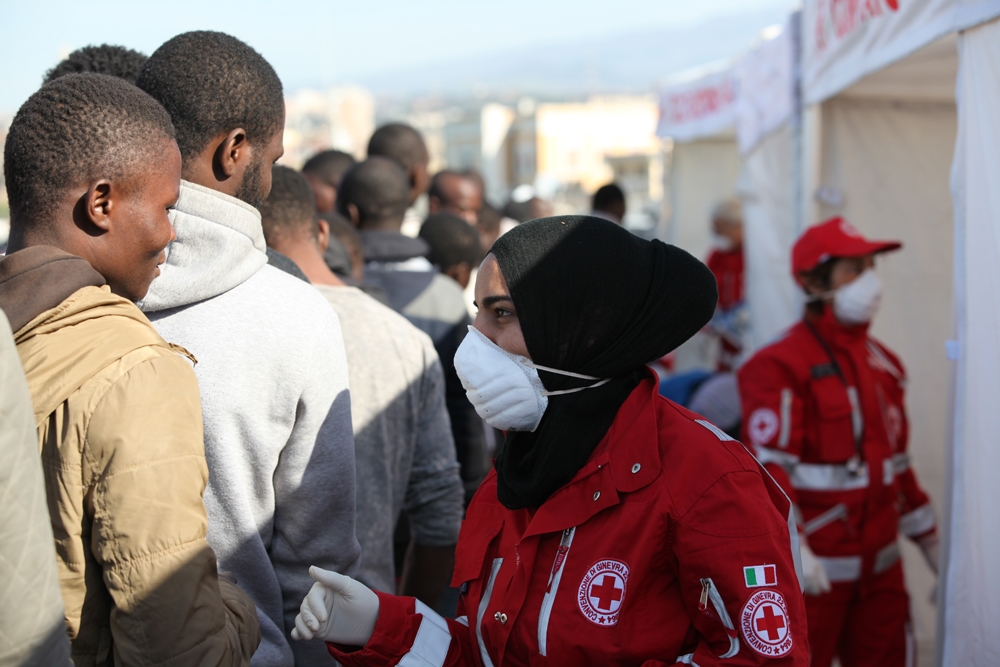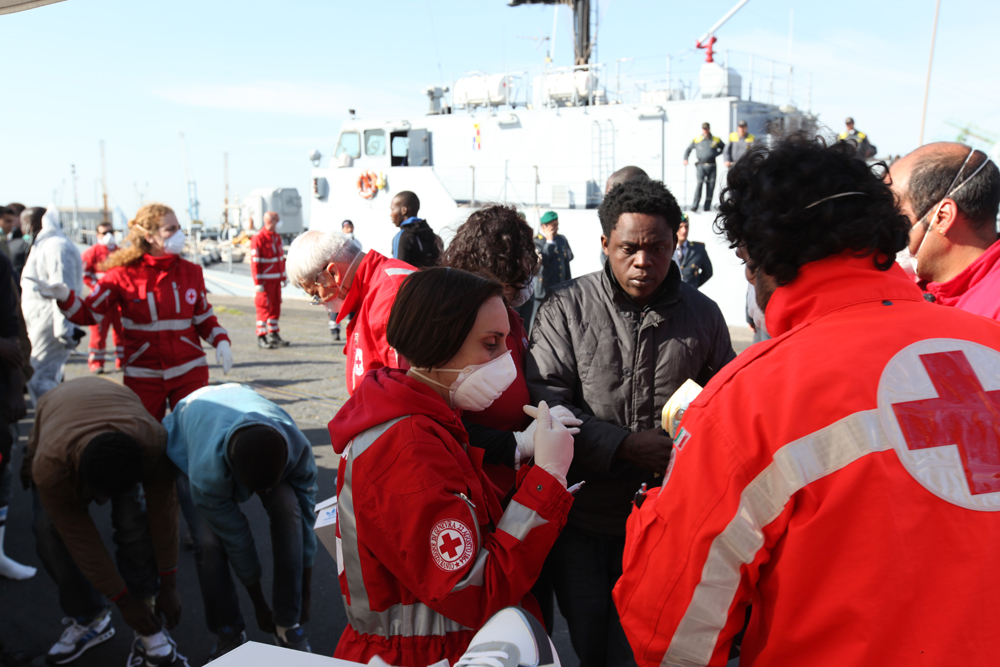21 Red Cross National Societies in the European Union call for more legal avenues to access protection
It is right that so much of the world's attention and sympathy is focused on the victims of the recent earthquake in Nepal. It is also right that we don't lose sight of the other humanitarian crisis that dominated our attention in the days preceding the earthquake - that of migrants drowning in the Mediterranean Sea.
Both crises are tragic and have taken thousands of lives. However, the sudden onset of a natural disaster makes a lot of difference to the way we react as observers. Prolonged, complex crises that accumulate victims over time fail to generate the outpouring of support common in reactions to an earthquake or a typhoon.
We need to challenge this reaction and recognise that the plight of migrants also constitutes a humanitarian emergency. Over 5,000 people are believed to have lost their lives attempting to reach Europe via the Mediterranean in the last 18 months. This makes these waters the most dangerous borders in the world. This should trigger action, commitment and support.

medical treatment, psychosocial support and counseling along with fresh water and shoes for migrants. © Damien Fulton Naylor / IFRC.
We, the Red Cross Societies of Europe, know that the greatest efforts need to focus on the points of origin – on providing humanitarian assistance and making diplomatic efforts to ease conditions within the conflict zones, refugee camps and impoverished countries that people are fleeing from. Addressing the underlying issues should be at the heart of any strategy. We must, however, not be naive about its ability to produce instant results. Many of the world’s most violent conflicts, such as those in Syria, Iraq or South Sudan, are far from resolution. Some of the world's most difficult political contexts, such as in the Horn of Africa, will not be resolved through aid alone.
Even where substantial aid is provided, such as in refugee camps, we know that tents, blankets and food make life slightly more tolerable, but they do not reduce the hardship, indignity and frustration of camp life. It is only natural that people want and need more than to be kept alive by aid. Therefore the most desperate and determined will continue to risk everything for the chance to build a better future.
Any attempt to suppress that ambition will fail. In many cases, it will also be morally unjustifiable considering the terrors and extreme poverty that people are fleeing from and the numbers of people on the move. Last year, the number of people forced to migrate exceeded 50 million for the first time since the Second World War. People will continue to flee desperate situations and inaction by the EU and its member states will only lead to more suffering. It will mean more harrowing tales of exploitation and abuse, culminating in terrifying and deadly journeys like the one across the Mediterranean Sea.
Many have been urging for inaction as all options to ease the journey could be seen as a pull factor. We in the Red Cross urge our governments to rise above such rhetoric, recognise that migration is a fact of life, and meet their obligations under international law. We must find humane and effective ways of managing it as an international community.
Last month, European leaders held a summit in Brussels and committed to increasing the search and rescue operations across the Mediterranean.
Improving the scope of search and rescue is vital but should be only one component of a broader strategy.
The summit was just the beginning. We need to build on it to develop migration and asylum policies which are forward-looking and firmly based on the principles of humanity, solidarity and respect for human rights. These policies must both aim to address the underlying issues, and ensure legal protection and essential humanitarian assistance along the well-known migration routes.

Controversially, but crucially, it will also require doing more to offer safe and legal ways to claim asylum across Europe and to distribute that responsibility proportionately and fairly across the continent. Despite fears to the contrary, this will still represent a minority of asylum applications. As UNHCR continues to emphasize - over 80% of refugees choose to stay as close as possible to their country of origin in order to preserve the possibility of going home. Consequently, this places the lion’s share of the responsibility for supporting the world’s most vulnerable people not on the shoulders of the first world economies of Europe but on the shoulders of some of the world’s poorest countries.
We should bear that fact in mind before denying our responsibilities in this crisis. Migration and asylum claims are part of our modern world and we need to be pro-active in international collaboration between countries of origin, transit and destination in order to preserve the right to seek international protection.
This might not be popular everywhere, but it is the right thing to do.
This Opinion has been endorsed by:
Werner Kerschbaum - Secretary General, Austrian Red Cross
Philippe Vandekerckhove - CEO, Belgian Red Cross-FL
Prof. Danièle Sondag-Thull - CEO, Belgian Red Cross - FR
Michael Adamson – CEO, British Red Cross
Mag. Pharm. Hristo Grigorov Dr. H.C - President, Bulgarian Red Cross
Robert Markt - Executive President, Croatian Red Cross
Takis Neophytou - Director General, Cyprus Red Cross Society
Anders Laderkarl - Secretary General, Danish Red Cross
Kristiina Kumpula - Secretary General, Finnish Red Cross
Stephane Mantion - Director General, French Red Cross
Dr Rudolf Seiters - President, German Red Cross
Dr. Zsigmond Göndöcs - President, Hungarian Red Cross
John Roche & Sandra Stanley - Interim Secretaries General, Irish Red Cross
Francesco Rocca - President, Italian Red Cross
Grazina Jevgrafoviene - Secretary General, Lithuanian Red Cross
Michel Simonis - Director General, Luxembourg Red Cross
Paulette Fenech - Director General, Malta Red Cross
Gijs de Vries - CEO, Netherlands Red Cross
Asne Havnelid - Secretary General – Norwegian Red Cross
Leopoldo Perez Suarez - Secretary General, Spanish Red Cross
Ulrika Årehed Kågström - Secretary General, Swedish Red Cross
For media inquiries, please contact Eva Oyón on: eva.oyon@redcross.eu or +32 2 235 09 22

